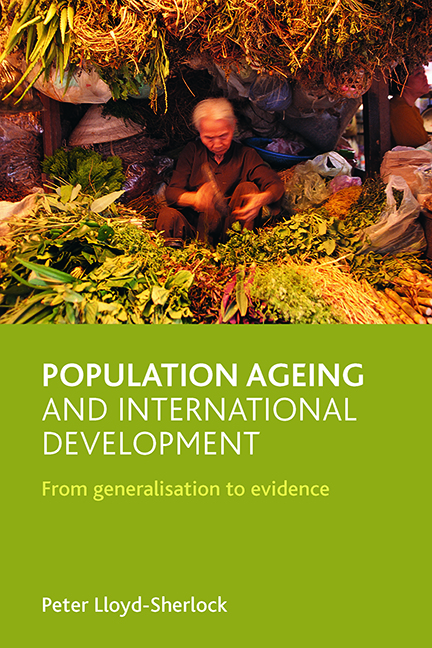Book contents
- Frontmatter
- Contents
- List of abbreviations
- Acknowledgements
- Notes on the author
- Introduction
- one International development and population ageing
- two Experiencing later life in contexts of development
- three Older people, pensions and development
- four Population ageing and health
- five Later life and social relations: family, migration and care
- six Ageing and development in South Africa
- seven Ageing and development in Argentina
- eight Ageing and development in India
- nine Conclusions and overview
- References
seven - Ageing and development in Argentina
Published online by Cambridge University Press: 15 July 2022
- Frontmatter
- Contents
- List of abbreviations
- Acknowledgements
- Notes on the author
- Introduction
- one International development and population ageing
- two Experiencing later life in contexts of development
- three Older people, pensions and development
- four Population ageing and health
- five Later life and social relations: family, migration and care
- six Ageing and development in South Africa
- seven Ageing and development in Argentina
- eight Ageing and development in India
- nine Conclusions and overview
- References
Summary
Introduction
Argentina is a relatively wealthy country, with an embracing welfare system and an aged population structure. As such, it may offer insights relevant to the future for other developing countries. Despite this, it is widely accepted that Argentina's economic performance over the past 70 years has been poor and erratic. The causes of this decline are complex, but this chapter will seek to assess whether population ageing has played any role in hindering growth. The chapter will also consider how this gradual decline has affected experiences of ageing and the lives of older people. It follows broadly the same structure as the other country case studies in this book. First, it provides a brief overview of Argentina's economic and social development. This is followed by an analysis of demographic trends, including fertility transition and population ageing. The chapter then focuses on a number of key themes. In this case, they cover potential economic impacts of population ageing, as well as the provision of social security and health services, and the care economy. These more general analyses are complemented by three life histories of older Argentines, which reveal the diversity of old-age experiences and the different ways in which national factors intersect with personal biographies.
Social and economic development in Argentina
In the first half of the 20th century, Argentina was one of the richest countries in the world. In terms of development and social welfare, it was seen as much closer to Australia, Canada and New Zealand than to its Latin American neighbours (Platt and Di Tella, 1985). By the end of the 20th century, decades of extreme economic instability and growing social inequality had relegated Argentina to ‘developing country’ status. The scale of Argentina's relative decline was dramatic: in 1950, average per capita incomes were still 84% of the Organisation for Economic Co-operation and Development’s, by 1987 they had fallen to only 43% (Della Paolera and Taylor, 2003). The Argentine experience demonstrates that development should not be understood as an inevitably linear and irreversible process. Current cohorts of older people were born into a prosperous country and lived through its decline, which will have shaped the courses of their lives and their situation in old age.
- Type
- Chapter
- Information
- Population Ageing and International DevelopmentFrom Generalisation to Evidence, pp. 171 - 200Publisher: Bristol University PressPrint publication year: 2010



